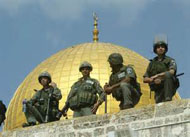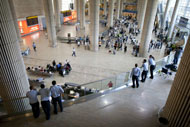
The Israeli government and settler mentality of “What is mine is mine and what is yours is mine, too” has always been a problem. Their conquest of most of Palestine in 1948 was because they were “regaining their biblical homeland”; consequently, this included the West Bank and Gaza, which it only managed to occupy 19 years later. To Israel, this was not the occupation of someone else’s land; this was part of the land of Israel, which was only now being restored to its owners. The Palestinians were nothing but – and still are – bothersome collateral damage.
For some reason, perhaps because this jungle-like mentality remained unchecked for all of these years, the sense of “everything is mine” has risen to dangerous heights. One of the most visible manifestations of this mentality is in my own back yard: the Aqsa Mosque.
Although this site is the third holiest place in Islam, where Prophet Mohammed is said to have ascended to heaven on his winged horse, the conflict over the site goes far beyond religious interpretations. In the heart of the Old City of Jerusalem, it is technically in the eastern sector of the city, under Israeli occupation. The entire world recognizes its occupation and has not recognized – at least at the official level – Israel’s unilateral annexation of the city.
That has not deterred this self-righteous mentality from impinging on places where others reside and hold sacred and dear to them. With each passing day, more and more right-wing extremist settlers and Israelis insist on entering the Aqsa Mosque Compound. They walk the grounds, try to conduct Jewish prayers and always do so under the protection of the Israeli army and police. Muslims meanwhile either bite the bullet and hope the unnatural visits end quickly or, more often than not, they protest. Hundreds of Palestinians have been arrested and injured in clashes with Israeli troops and settlers on the holy premises and others have been banned entry to it altogether.
The fact of the matter is that Israel’s official narrative – that this is the exact place where the second temple was built and where the third one will eventually be reconstructed, has become a given for so many. The premise is that Jews have every right to enter and pray in Al Aqsa because the temples came first and this is ostensibly the holiest site in Judaism. The thousands of years of history and religious significance for Muslims around the world are made completely irrelevant not to mention that the Israeli narrative can always trump anyone else’s, especially the Palestinians. The seemingly religious aspect of the argument is actually entirely political at its core.
This mentality plays out just as viciously when it comes to land and property. In Jerusalem it is about homes, in the West Bank about land. Palestinians find themselves served with papers somehow claiming that Jews had ownership rights to their house years ago, even before Israel was created. The same, it might be added, does not apply to Palestinians who lost their homes in 1948 and have the real deeds to the houses, which were stolen from them not even 70 years ago. But again, Israel’s claim over west Jerusalem is uncontested by the world and now places within east Jerusalem are as well.
It is a scary thing to see the denial of one’s history and attempts to erase it right before one’s eyes. Some extremist Jewish groups have even called for the destruction of the Dome of the Rock so that the Third Temple could be built in its place.
If there is no authority to rein in this madness, it is reasonable to say that it will continue unabated. That has been the case for years. The world, Arab, Muslim, Christian and everyone that falls in between, has a duty to preserve, not just buildings, but the history of a people that have fought long and hard to do it one their own. Palestine will never be erased in our hearts, including the Aqsa and Jerusalem. The fear is that it will be erased on the ground because no one was brave enough to challenge Israel’s belief that everything in this tiny country is exclusively theirs.
Joharah Baker is a Writer for the Media and Information Department at the Palestinian Initiative for the Promotion of Global Dialogue and Democracy (MIFTAH). She can be contacted at [email protected].









